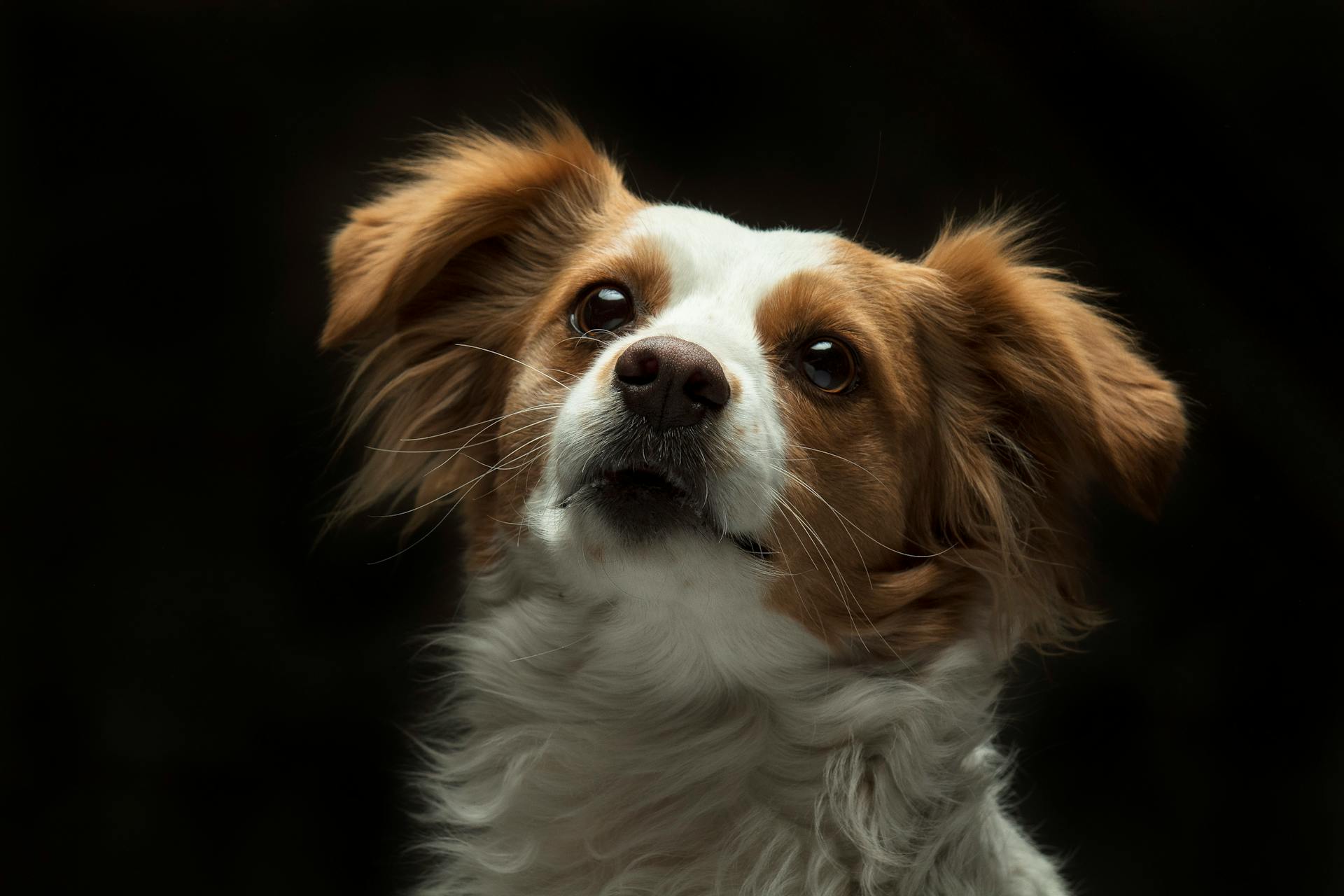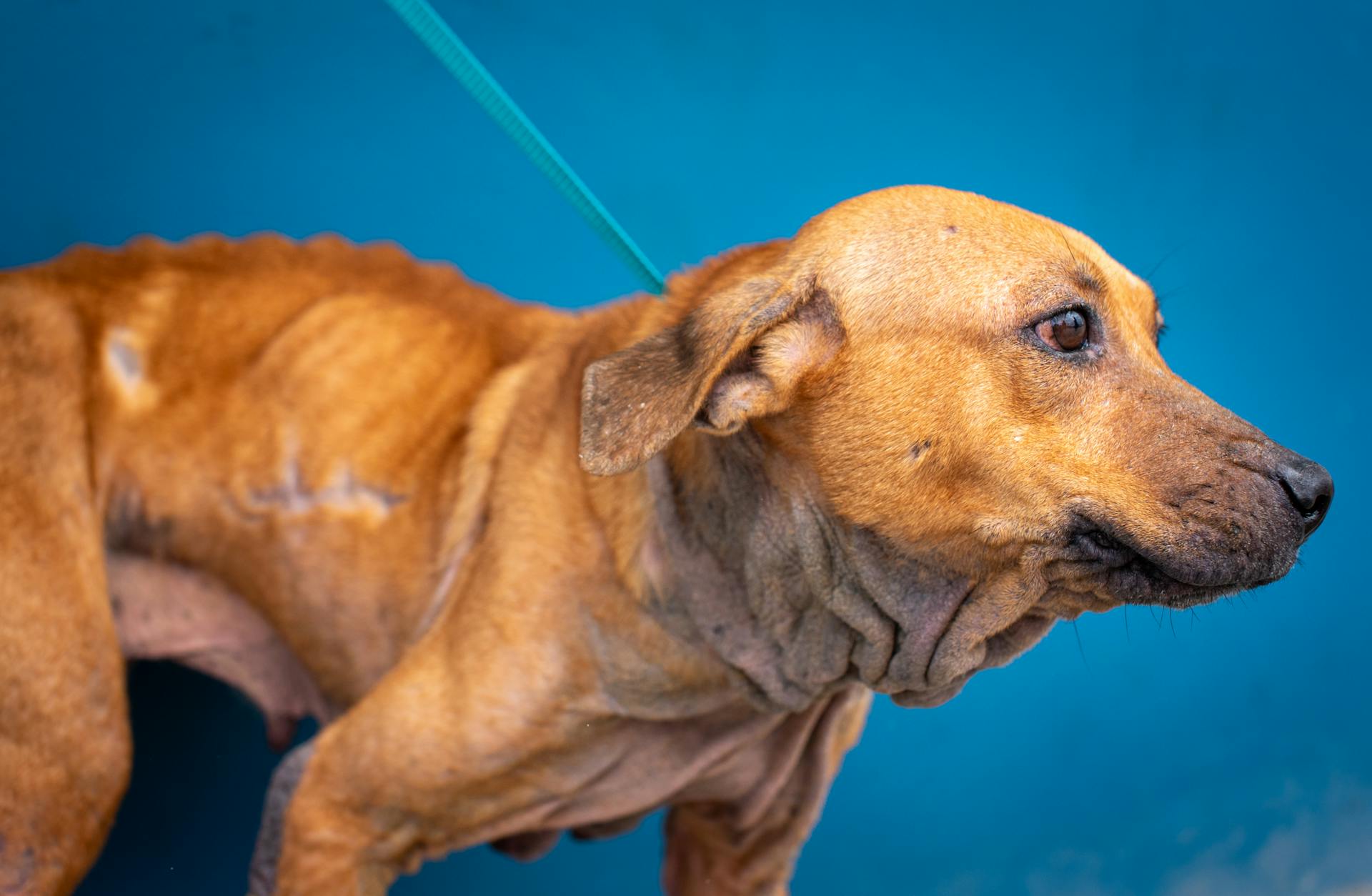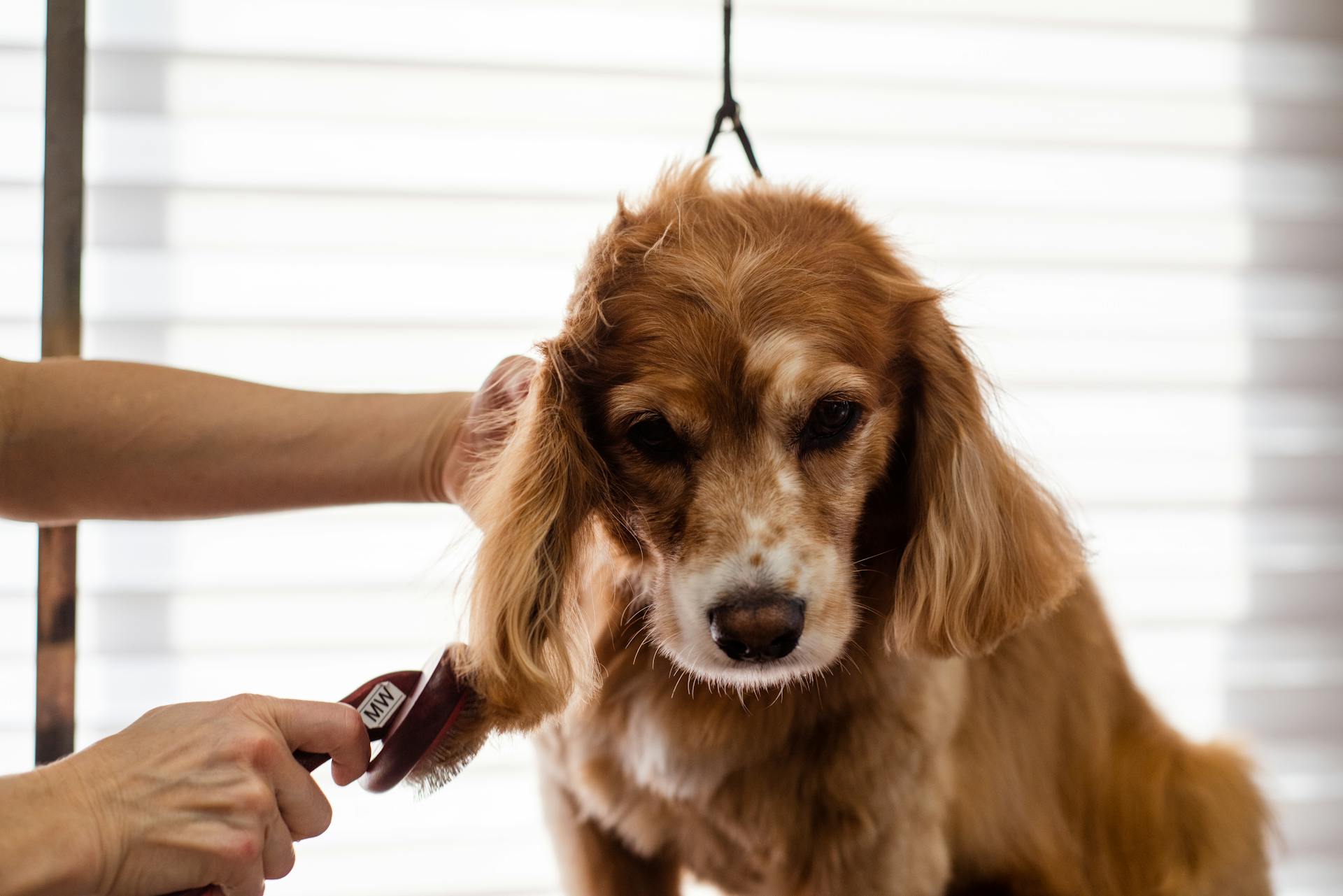
The Coton De Tulear is a breed that's hard to resist, with their adorable fluffy coats and playful personalities. They make great companions for many families, and one of the reasons is their hypoallergenic status.
These dogs are known for their low-shedding coat, which means they produce less dander than other breeds. This makes them a great choice for people with allergies.
In fact, the Coton De Tulear's coat is made up of a single layer of soft, cottony fur that requires regular grooming to prevent matting. This is a big plus for owners who want a low-maintenance pet.
Their friendly and outgoing nature also makes them a great fit for families with children.
Related reading: Hypoallergenic Low Energy Dogs
Caring for a Coton
Cotons de Tulear are generally easy to train, making them a great choice for first-time dog owners.
They require moderate care in terms of their exercise needs, but this can be easily managed with daily walks and playtime.
Their high maintenance grooming needs may seem daunting, but it's a great opportunity to strengthen your bond with your Coton.
With regular brushing, you'll get to know your Coton's temperament and personality, making it a joyful experience for both of you.
Grooming
Grooming is a big part of owning a Coton de Tulear, but don't worry, it's worth it for their adorable faces and low-shedding coats.
You'll need to brush your Coton's coat once a day to prevent mats from forming and keep their fur looking its best. A slicker or pin brush is perfect for the job.
Cotons don't shed much, but they do lose some hair around springtime, so be prepared for a bit of extra grooming during this time. They're considered a hypoallergenic breed, but with light seasonal shedding, they're not completely risk-free for those who are allergic to dogs.
Weekly bathing with a whitening shampoo will help cut down on allergens while keeping their coats vibrant and more manageable. Be gentle when drying them, as rubbing with a towel can create knots in their hair.
To keep your Coton's hair out of their eyes, you can use a hair elastic to secure the stragglers in a high pony tail on top of their head. This works for both female and male dogs.
See what others are reading: American Bully Coats
Here are some grooming tips to keep in mind:
- Brush your Coton's coat once a day with a slicker or pin brush.
- Bathe your Coton weekly with a whitening shampoo.
- Trim your Coton's nails once or twice a month.
- Brush your Coton's teeth daily to prevent dental problems.
By following these grooming tips, you'll be able to keep your Coton de Tulear happy and healthy.
Training
Training a Coton de Tulear is a joy, as they're incredibly bright and eager to please. They thrive on positive reinforcement, learning quickly through consistent repetition and rewards.
Cotons love treats, which makes training a breeze. They'll intuit what makes you happy and what doesn't, and will adjust their behavior accordingly.
Socialization is key from an early age, exposing them to various people, pets, and situations. This helps them become social and easy-going as adults.
Using treats to keep things positive is a great way to train a Coton. They'll quickly learn what behaviors are desirable and what aren't.
Cotons are not yappy, but they will bark to alert you to someone's presence. However, they're not the best watchdogs, as they'll likely greet strangers with kisses.
They're highly trainable due to their eagerness to please and love of treats. They excel in agility and conformation sports, making them a great choice for active owners.
Consider reading: Can Shiba Inu Reach 1 Dollar
History and Origin
The Coton de Tulear is a breed with a rich history, and its name literally translates to "Cotton of Tulear" due to its cottony coat and origins from the seaport town of Tulear in Madagascar.
This breed was once exclusive to the noble and ruling class in Madagascar, with their ownership restricted to the elite. They were the "royal dog" of the island nation.
The exact origin of the Coton de Tulear is unclear, but one theory suggests that small white dogs, possibly Maltese, survived a shipwreck and mated with local dogs, producing the fluffy offspring that the island's elites fell in love with.
The Coton de Tulear's popularity exploded in Europe in the 1960s, and they made their way to North America in the 1970s, where they were first registered by the American Kennel Club in 2014.
You can now find reputable Coton de Tulear breeders on the AKC website, and the cost of a Coton de Tulear puppy typically ranges from $2,000 to $3,000, which includes vaccinations and health screenings.
For your interest: South Korean Jindo Island
Hypoallergenic Dogs
Hypoallergenic dogs are specifically bred to produce fewer allergens in their hair, making them a good fit for people with allergies. However, no dog is 100% allergen-free.
Dogs with longer hair and those requiring regular grooming produce less dander and shed less. This is why some breeds are considered hypoallergenic.
The American Kennel Club notes that dogs with longer hair are less likely to stir up allergies. Regular grooming can also help reduce allergens.
Even hypoallergenic dogs still contain allergens in their skin, saliva, and urine, which can trigger an allergic response. This is why it's essential to be aware of the allergens present in a dog, even if it's considered hypoallergenic.
Dogs that don't have much hair, like the Chinese Crested or the Xoloitzcuintlia, are the perfect companions for allergy-prone humans. However, they may still produce allergens in their skin and other bodily fluids.
A different take: Why Do Dogs Grab a Toy When You Get Home
Choosing the Right Dog
Some dog breeds are less likely to stir up allergies, but it's essential to note that no breed is 100 percent hypoallergenic.
Dogs with longer hair and those requiring regular grooming produce less dander and shed less, making them a better fit for allergy-prone humans.
The American Kennel Club suggests considering breeds with these characteristics when choosing a dog.
Dogs that don't have much hair, like the Chinese Crested or the Xoloitzcuintlia, are also a good option for those with allergies.
These breeds are often the perfect companions for people who are easily triggered by dog dander and saliva.
Living with a Coton
Cotons de Tulear are generally easy to train, making them a great fit for first-time dog owners. They are also pretty high maintenance when it comes to grooming, requiring regular brushing to prevent matting.
Their good nature makes them a good fit for other pets and kids, especially when introductions are made properly. This is because Cotons de Tulear are easygoing pups.
As a hypoallergenic breed, Cotons de Tulear are less likely to stir up allergies. They may shed less and produce less dander, making them a great choice for people with allergies.
Cotons de Tulear require moderate care in terms of exercise needs, but they are a breeze to care for in every other way.
Broaden your view: When Should I Breed My Female Dog
Frequently Asked Questions
Can you be allergic to a Coton de Tulear?
While Cotons are considered hypoallergenic, no dog is 100% allergen-free. It's essential to spend time with a Coton de Tulear before bringing one home to gauge your allergic reaction
Do Coton de Tulear dogs shed?
Coton de Tulear dogs shed minimally, but require occasional brushing to prevent matting. They are a good choice for those with allergies.
Sources
Featured Images: pexels.com


